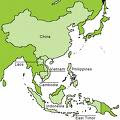By Rebecca Ruiz, Forbes.com
Inspired by Southeast Asia’s natural beauty and rich culture, many travelers are showing an interest in the area’s alternative “eco” vacations, like the one offered in the Thai National Forests.
Participants on this 10-day tour (airfare and two nights’ stay in Bangkok not included) receive an intensive education in regional ecology and conservation efforts, which range from using biogas to discourage logging and creating communal farms to decrease poaching. Highlights include trips to the Erawan, Budo Sungai-Padi and Khao Yai national parks, where tropical birds, elephants and Asiatic tigers live.
It’s one of many luring travelers to the region. As travel to Southeast Asia continues to rise — an estimated 60.4 million tourists visited the region in 2007 — many visitors are forgoing traditional packages and chain hotels and instead discovering the nascent ecotourism market.
Ecotourism is broadly defined as “responsible” or “ethical” travel during which tourists try their best to minimize environmental impact and ensure their spending and presence benefits the local community. This niche market has grown steadily in recent years.
While it’s difficult to estimate the region’s share of this growth, experts say that examples like a solar-powered lodge in Sumatra, Indonesia, and a conservation-focused tour of the Sukau rainforest in Malaysia are indicative of a growing trend to provide tourists in Southeast Asia with culturally sensitive and environmentally friendly vacations.
“Some of [these countries],” says Ayako Ezaki, director of communications for the International Ecotourism Society, “have taken advantage of the natural and cultural heritage they have to develop tourism. They’ve highlighted those beauties and attracted tourists.”
Enlightening Excursions
Though the market in Southeast Asia is still growing, there are several countries in the region that offer ecotourism options, including Thailand, Cambodia, Laos, Vietnam, Malaysia and Indonesia.
Visitors to northern Laos, for example, can stay at the Boat Landing Guest House, an eco-lodge certified by Green Globe, a company that rigorously evaluates a hotel’s environmental practices. Guests at the riverside bungalows can rest assured the lodge is working to reduce its solid waste through recycling and composting. Tourists can spend their time trekking, rafting and biking in the nearby protected forests.
On a trip through the Sukau rainforest in Malaysia, where the landscape features jungles, paddy fields and rivers, tourists will learn about local turtle conservation efforts and stay at the 20-room Sukau Rainforest eco-lodge where the water is heated with solar power and “passes” have been built into the land to accommodate elephant migration in the area. The lodge charges one dollar extra per international adult guest and uses it to fund projects like wildlife rehabilitation and tree planting.
Travelers worried about their carbon footprints can try a two-week trip to Cambodia, for which the tour operator can purchase carbon offsets. Highlights include visits to Angkor Wat, a 12th-century temple, and the Royal Palace, as well as the knowledge that the economic and environmental impact on communities is closely monitored.
A range of policies and practices like these are important, according to Dr. Eric Crystal, a lecturer at University of California, Berkeley, who has researched the positive and negative consequences of tourism in Southeast Asia.
“Tourism has brought a lot of good and bad things,” Crystal says. But people can also be very conscious, he says, of what they can put back.
